I have to begin by admitting that I have never read The Grapes of Wrath, embarrassing though that is for someone with a graduate degree in English literature to admit. As I told people who have read the novel (more or less everyone else I know, it seems) that I was going to see Krannert’s production of Frank Galati’s 1990 adaptation of Steinbeck’s masterpiece last week, many of them brought up the “shocking” ending of the book (without spoiling it for me) and said they were curious about whether the production would “go for it” or not. It was thus with a slight sense of trepidation that I took my seat in Krannert’s Colwell Playhouse last Wednesday night for the dress rehearsal performance of the play directed by William Brown, wondering what exactly I had let myself in for.
That trepidation was unnecessary. The answer to my friends’ curiosity is that yes, the play stays true to the potentially shocking conclusion of Steinbeck’s work, and those attending should be prepared for instances of nudity and adult themes throughout the performance. That memorable final scene, however, is tastefully handled and serves as an extraordinarily moving ending to the story of the ill-fated Joads and their trek from Dust Bowl-stricken Oklahoma to their supposed promised land of California. The evening as a whole is a sobering but worthwhile trip to 1930s America featuring consistently solid acting performances and a seemingly simple set used to breathtaking effect.
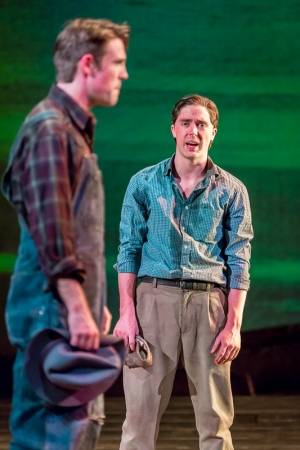 The Joads embark on their trip out west dreaming that the promised abundance of fruit harvesting jobs in California will be the answer to their woes following the loss of their Oklahoma farm. The family’s initial optimism is soon buffeted by tragedy and shattered hopes, but matriarch Ma Joad does her best to keep the family facing the future together. Young Tom Joad, who has just returned from prison at the beginning of the play, becomes increasingly angry at the conditions the family encounters and is ultimately drawn toward a new calling in life in response. Over the course of their journey, the family encounters many fellow dreamers on the road along with those who have been rudely awoken from their dreams and those who selfishly prey upon the dreams of others.
The Joads embark on their trip out west dreaming that the promised abundance of fruit harvesting jobs in California will be the answer to their woes following the loss of their Oklahoma farm. The family’s initial optimism is soon buffeted by tragedy and shattered hopes, but matriarch Ma Joad does her best to keep the family facing the future together. Young Tom Joad, who has just returned from prison at the beginning of the play, becomes increasingly angry at the conditions the family encounters and is ultimately drawn toward a new calling in life in response. Over the course of their journey, the family encounters many fellow dreamers on the road along with those who have been rudely awoken from their dreams and those who selfishly prey upon the dreams of others.
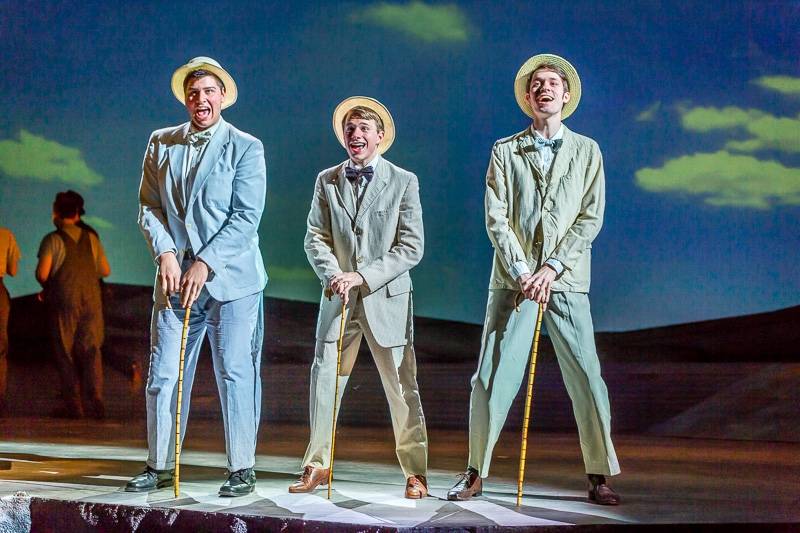
All this requires a large ensemble, and the head of the Theatre department joked while introducing the play that they had been worried that so much of the department was in the show that there might be no one left to attend the dress rehearsal as an audience member. Some actors do play multiple roles, but the cast is definitely big and their numbers are used to great effect at times. The synchronized choreography of the group of stoic striking workers outside the  gates of the place where the Joads hope to finally find work will remain vivid in my mind for a long time. There are many standouts among the larger ensemble, including Ninos Baba’s portrayal of a shattered man on his way back east and Xavier Roe’s Floyd Knowles, who welcomes the Joads to California with another dose of hard truth-telling. Jordan Pettis, portraying the troubadour narrator, played a key part in quickly transporting the audience to the 1930s with Woody Guthrie-inspired musical interludes that were a highlight of the show. The stars of the show, though, are the Joads and Jim Casy, the lapsed preacher who tags along with them from Oklahoma and ends up becoming directly involved in the labor struggle in California.
gates of the place where the Joads hope to finally find work will remain vivid in my mind for a long time. There are many standouts among the larger ensemble, including Ninos Baba’s portrayal of a shattered man on his way back east and Xavier Roe’s Floyd Knowles, who welcomes the Joads to California with another dose of hard truth-telling. Jordan Pettis, portraying the troubadour narrator, played a key part in quickly transporting the audience to the 1930s with Woody Guthrie-inspired musical interludes that were a highlight of the show. The stars of the show, though, are the Joads and Jim Casy, the lapsed preacher who tags along with them from Oklahoma and ends up becoming directly involved in the labor struggle in California.
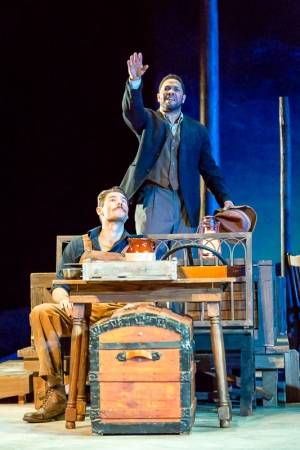 As Jim Casy, Raffeal Sears believably transforms from a relatively jovial figure in Act I to the intense labor leader of Act II and convincingly portrays the former reverend as a likable but lost man poignantly searching for meaning in his life. All of the Joads turn in effective performances as well, with special mention going to Mindy Shore as Ma Joad and Ryan Smetana as Tom Joad, both of whom pull off particularly emotionally demanding roles. The Joads are perhaps most affecting as a collective group desperately trying to stay together despite the odds, however, and one of my favorite scenes was the one in which the family first spots California in the distance and piles out of the “car” (suggested on stage by a clever piling up of crates and furniture) to gaze out at the horizon. Each actor did such a good job of conveying the family’s hope in that moment that I found myself tearing up on their behalf while desperately wishing for a brighter future for them. An early roadside funeral is another good example of all the actors working well together to create an enormously moving scene, as the devastated group sings a traditional hymn together as they bury a loved one.
As Jim Casy, Raffeal Sears believably transforms from a relatively jovial figure in Act I to the intense labor leader of Act II and convincingly portrays the former reverend as a likable but lost man poignantly searching for meaning in his life. All of the Joads turn in effective performances as well, with special mention going to Mindy Shore as Ma Joad and Ryan Smetana as Tom Joad, both of whom pull off particularly emotionally demanding roles. The Joads are perhaps most affecting as a collective group desperately trying to stay together despite the odds, however, and one of my favorite scenes was the one in which the family first spots California in the distance and piles out of the “car” (suggested on stage by a clever piling up of crates and furniture) to gaze out at the horizon. Each actor did such a good job of conveying the family’s hope in that moment that I found myself tearing up on their behalf while desperately wishing for a brighter future for them. An early roadside funeral is another good example of all the actors working well together to create an enormously moving scene, as the devastated group sings a traditional hymn together as they bury a loved one.
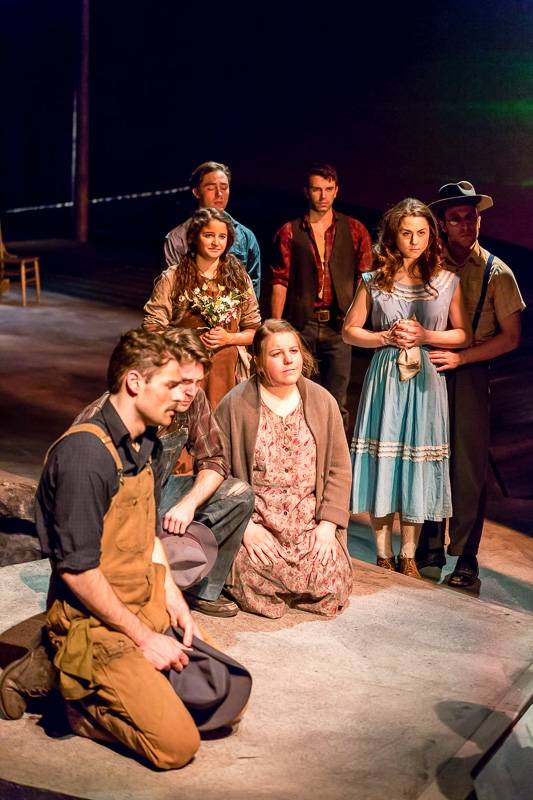
One of the most impressive aspects of this production is the way in which the fairly minimalist-looking set combines with sound and lighting design to convincingly portray a variety of outdoor settings. At times actual imagery of the landscape is projected on a screen at the back of the stage, but just as much is frequently done with subtle changes in the tint of the lighting or the use of natural sound effects like birdsong or crickets chirping. More dramatic effects help as well, and while it would seem churlish to give them all away here—the audience actually gasped in delighted surprise at several points during the evening—I can say that the designers working on this play have fully succeeded in creating an immersive atmosphere for the audience that feels like they really are outside on the road with the Joads. The onstage “river” alone is worth the price of admission.
Skinny dipping in the aforementioned river is one of the much needed lighter moments that keep this almost three-hour play from being relentlessly depressing. Ryan Czerwonko as Grampa delivers another such moment with his entertaining early joking about what he intends to get up to in California, and a joyous Act II dance does much to lighten the atmosphere before things inevitably go sour once again. Three hours is still a bit long for a play dealing with such serious subject matter, but for the most part I didn’t feel like the action dragged, especially once Act II began. When my mind did wander, it was usually (if not always) to think about ways in which the play’s action reminded me of things happening in 2016 rather than to think about my grocery list or what time it might be.
So, am I going to finally read The Grapes of Wrath now that I’ve seen this impressive production? Well, maybe. Regardless of whether I do or not, though, I’m glad to have been introduced to such a powerful story by such a talented group of people. Whether you count Steinbeck as one of your favorite authors or are still having traumatic flashbacks to reading Of Mice and Men in high school, this production has much to offer with a story that feels as relevant today as when the book was first published and its top-notch scenic, lighting and sound design. My recommendation is to head out west with the Joads at Krannert while you can: the trip is emotionally grueling but worth it.
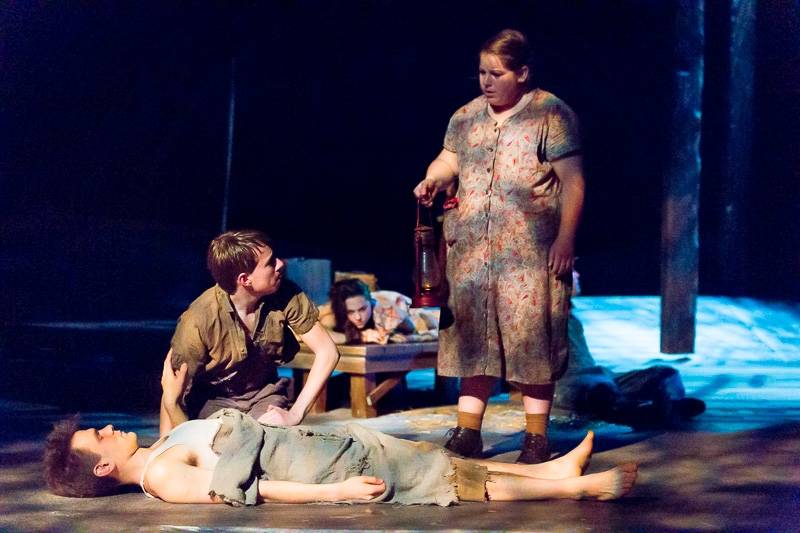
The Grapes of Wrath continues its run this weekend with performances Thursday-Saturday at 7:30 PM and a 3 PM matinee performance on Sunday, March 13th. Tickets are $25, with discounted tickets available for Senior Citizens ($24), Students ($13) and U of I Students and Youth ($8). Tickets can be purchased at the Krannert Box Office, by calling 800-KCPATIX, or online.
About Mara Bandy:
Mara Bandy is an Arts Writer for Smile Politely. Find her online at:
All photos by Scott Wells
Scott is a U.S. Navy veteran and a graduate of the University of Illinois. He has been a photographer and writer for Smile Politely since March of 2015.








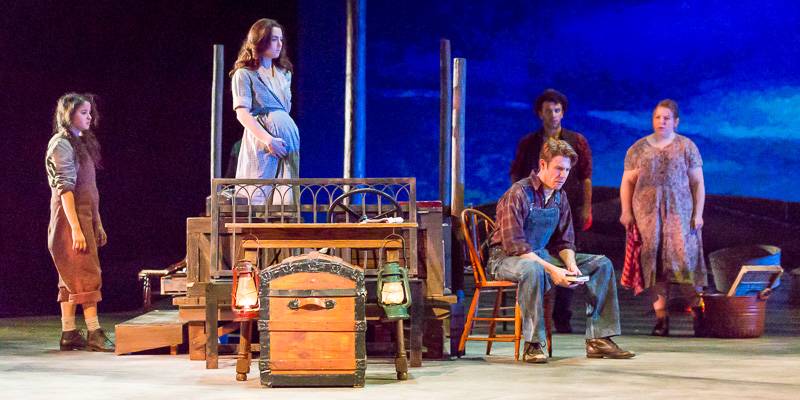
 About Mara Bandy:
About Mara Bandy: Scott is a U.S. Navy veteran and a graduate of the University of Illinois. He has been a photographer and writer for Smile Politely since March of 2015.
Scott is a U.S. Navy veteran and a graduate of the University of Illinois. He has been a photographer and writer for Smile Politely since March of 2015.